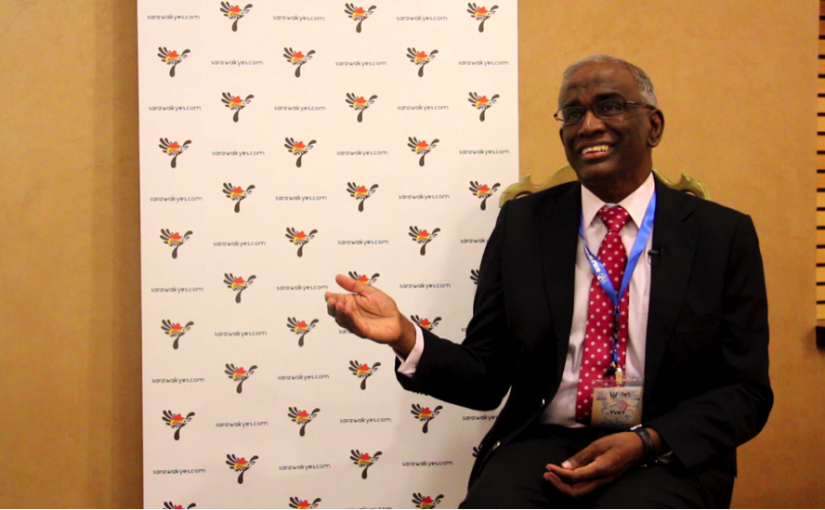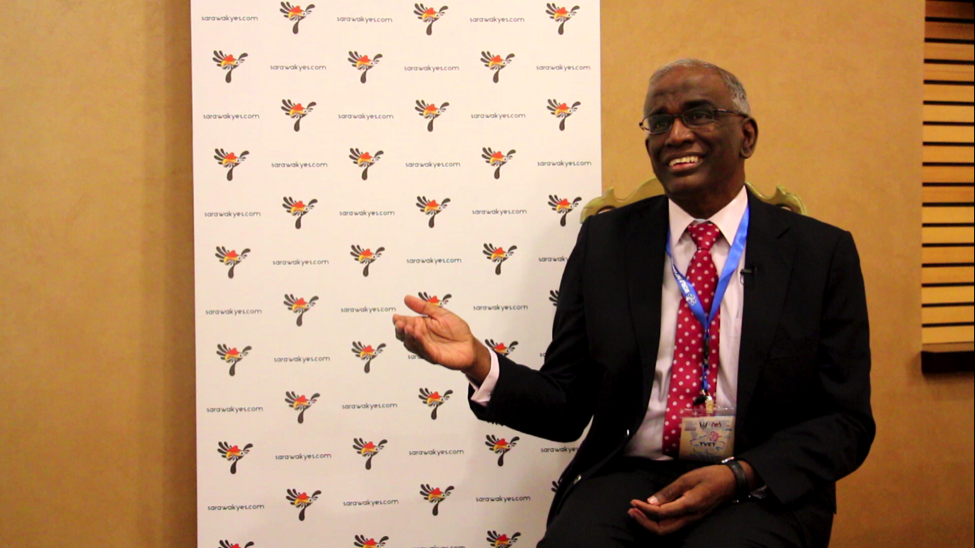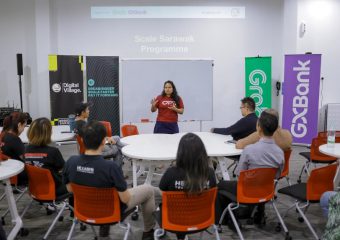Dato’ Dr. R. Palan, Chairman and CEO, SMR Group, spoke with SarawakYES! during last week’s World TVET Conference 2015 in Kuching. He shared with us some interesting views on being an entrepreneur in TVET and what you can do to put yourself on a path to success.
Q: What is the most common type of entrepreneur in TVET in Malaysia, or Sarawak?
A: I think … in every field you can have entrepreneurs from TVET. I think the most common thinking is in the hospitality industry, in the automotive industry, in the health industry etc. But I think that TVET is not restricted to any industry, I think it applies broadly to any. As I probably shared in my session, you’re not here to actually make it like a multi-million dollar business, but what it is to have a standard of living, give yourself a quality of life and be the boss of yourself. That’s what entrepreneurship is.
So whatever field you are from in TVET you have an opportunity. Now, in certain fields where there is a higher capital requirement, then you probably need to have a cooperative where you can get together with a few people and get the scales, the economies of scale, that are so important for a business to grow and be sustainable.
Q: So a cooperative with different fields of industry?
A: Absolutely. I think a cooperative with people with different skill sets. Maybe you join up a franchise. Let’s say for example, in the IT industry today, you can actually join up with a franchise and the franchises probably have sizes for anything. Or let’s say even in the business of a handyman – today you’ve got franchises, so you go up to a shopping mall and open up a small place and you are set, you are your own boss and you have actually become self-employed, you are in the business of entrepreneurship.
Q: What are some of the type of entrepreneurs that you feel would have great potential in Sarawak?
A: I think anything that is growing. For example, in the field of technology IT, not many people are IT savvy but they are great IT users. So there is an opportunity. In Australia today, you find that PC maintenance franchises are very, very successful. And I think that’s the way to go. So in every single field there are opportunities, you just want to look at (them) and say ‘is there a certain critical mass that’s actually going to make the business successful’?
Q: So basically identifying what the market needs?
A: Absolutely. Certainly I think anything in automotive today because everybody has got a car, the father’s got a car, mother’s got a car, son has got a car, daughter has got a car, grandchildren have got a car – so you know there are so many opportunities in the automotive industry. Everybody today has got a computer, whether it’s a mobile phone or let’s say it’s a tablet, or whether it’s a notebook – every single person has got an opportunity. So I think that’s the way to go, wherever the critical mass is.
Q: Can you list some of the essential strategies for entrepreneurs?
A: Have an idea. The idea should come from you because in your community, in your little town, you probably know what is actually in demand. Number two is, you need to gather information because entrepreneurship doesn’t happen just like that, something doesn’t fall from heaven, you’ve got to go and look at it and see what it is. Number three is, you must have that instinct, the gut feel, the fire in the belly. Number four is, you must have the initiative, and I think you have to take that initiative in order to do it first, the first mover advantage. And I think it’s about institutionalisation, making sure your idea takes firm roots and you actually make it commercially viable, because why do some people want to go into entrepreneurship, not into employment? Because they want to be their own bosses, because they want freedom, it’s more sustainable, you can build a business and it’s a pension for you when you get old. So when you do that, I think the whole idea is – right from ideas to instinct, to information, to initiative, and I think to institutionalising – all these are strategies for entrepreneurs to succeed.
Why does one not want to go into entrepreneurship? Because they feel it’s risky, you don’t get the security. So as long as the idea is solid, and then you actually build on that, then I think you are set. For example, if you take OldTown White Coffee, it was a franchise and it started and it became a hugely successful business model for people. And I think people found, let’s say if the chef was running the business, he found that he could actually earn a lot more than working for someone, and he also had personal satisfaction, job satisfaction, it was commercially viable so there were many, many things that come as a byproduct in entrepreneurship.
Q: You talk about people not wanting to become entrepreneurs because of the risk. Is there any kind of support that the government offers or are there any grants that can help fund new startups and businesses?
A: I think there’s a huge amount of things that the government is doing. I think there is franchise support if you want to go and get a franchise. I think the Ministry of Human Resources guides you. Today in Sarawak, I think, you’ve got the Department of Skills Development that helps you with training and the Human Resources Development Fund (HRDF) gives you training opportunities to learn; to start to do a business.
I think there are many funding opportunities out there. You just need to go and have a proper plan of action. Now sometimes you find that to get funding and grants you need to prepare a paper; you may not have the expertise. But there is always the expertise available out there which can help you gain the funding.
Q: Do you have any advice on how to encourage people to have more entrepreneurial spirit in Sarawak?
A: One is to share success stories, because I think the great role models will be those who have succeeded in Sarawak themselves, not somewhere else in Europe or the Americas. In Sarawak there are many successful role models of entrepreneurship – let’s share those successes. Number two, let’s show people where the opportunities are. Number three, I think it’s important to get people to think entrepreneurship, not think employment, because I think no government in this world can continue to create jobs for its population. But what every government in this world can do is to create opportunities for its people, and I’m sure that the Sarawak government will continue to do that. I think SCORE today opens up so many opportunities, and I think if you’re a Sarawakian you just need to acquire the skills, the skills to do something which is productive and valuable for the end product. And if you can actually mix that with entrepreneurship, you are set for whatever you want to do in life.




